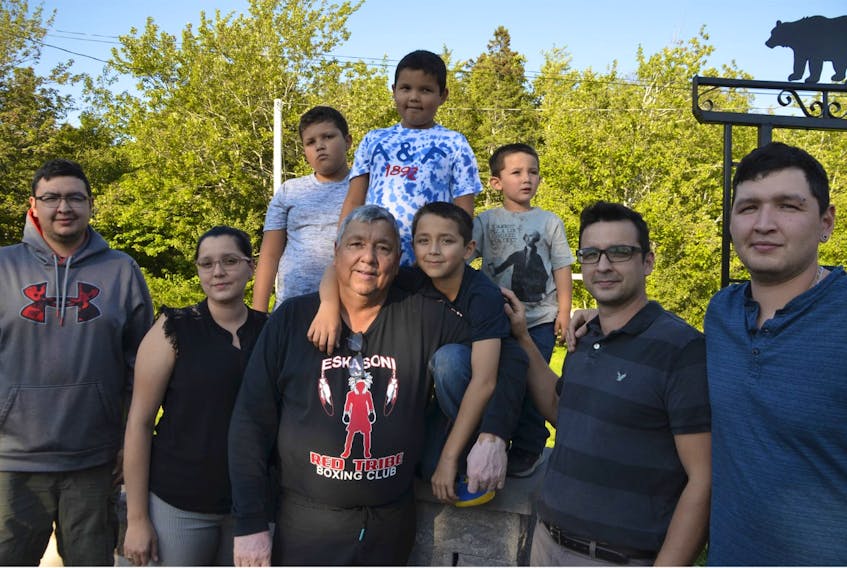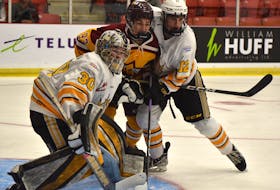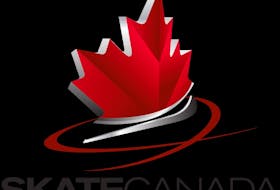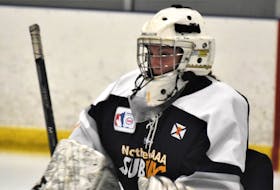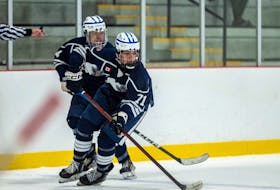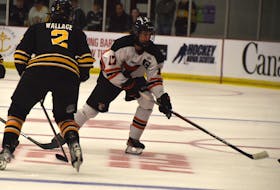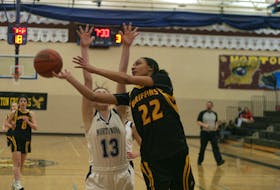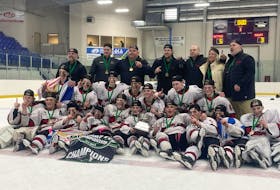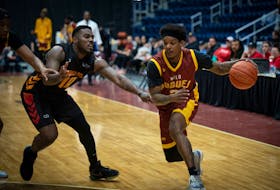ESKASONI, N.S. — Barry Paul Bernard was fighting with his brothers when his parents grew sick of it. So his father, Noel J. Bernard, bought him and his brother red leather boxing gloves and started Barry Bernard on his journey to support Mi’kmaq boxers in the ring.
“I have to credit my father because if it wasn’t for him, I wouldn’t be coaching boxing,” said Bernard.
Bernard runs the Eskasoni Red Tribe Boxing Club, is the Wagmatcook court liaison officer, the commissioner of professional combat sports in the province and is a professional photographer. But his passion for helping troubled boxers before they enter the legal system is a real driving force in his life.
“You become a mentor, you become a father figure to these kids, you’re not only a coach, you’re more than a coach,” said the 59-year-old.
The boxing club started five years ago in the Mi’kmaq community of Eskasoni and has supported more than 200 athletes during its time. Bernard said many of the athletes come from disadvantaged homes, some cycling in from the child welfare system, while others already have legal troubles.
He sees his role as guiding them to a better life.
Bernard said Mi’kmaq culture is a big part of the boxing club's success. He speaks to them in the language, offers to take his boxers to the sweat lodge and incorporates the seven sacred teachings — truth, love, respect, humility, honesty, wisdom and courage — into his coaching. And he is adamant they must take pride in being Mi’kmaq.
“When you are Aboriginal, you have to fight twice as hard ... But walking in that ring you are already a winner,” said Bernard.
He’s taken his team to Jamaica, Milwaukee, Ontario and throughout the Maritimes to show the kids the opportunities the world has to offer. Bernard usually takes them in his own vehicle and raises money to pay for the flights, hotels and the athletes' food.
Bernard knew he had to be there because of his own life.
His father was a welder and the family's pillar of support. When Barry Bernard was 15, his father had a stroke that left him paralyzed. In order to continue training, Bernard had to hitchhike to St. Peter’s in Richmond County, about 70 km from his home in We’koqm’a First Nation.
“I have to credit my father because if it wasn’t for him, I wouldn’t be coaching boxing,” — Barry Bernard
When Bernard was 19 he was invited to an enhanced boxing camp but couldn’t make it. Now, the Bernard family is committed to Mi’kmaq boxers.
“My family and I will help those kids get to the next level of boxing,” said Bernard.
His wife Eleanor Bernard is also a boxing coach, two of his children also help coach, while the other two are boxing officials.
Barry Bernard, who has 10 grandchildren and two dogs, says family members all do their part to raise money to purchase boxing gear, like mouthguards, boxing trunks and other equipment for the athletes. He says Eskasoni and the Mi’kmaq nation are very supportive in the fundraising efforts.
The boxing club expanded last year and has a satellite boxing club in Ugpi’Ganjig, Eel River Bar First Nation, about 300 km northwest of Moncton, N.B.
The boxing coach gets so busy his children tell him to slow down.
“We kind of have to ground him from the club and take over and tell him you can’t come here for one or two days, and when he's recharged he comes back,” said his daughter Candace Bernard, who is also a boxing official.
The 37-year-old Candace lives in Eskasoni and works as an elementary school teacher when she is not at the boxing club. She first picked up a pair of gloves when she was four years old in her grandparents' garage. She remembers hitting her father's hands then and now sees boxing as family time.
“It’s my comfort zone, we grew up in the ring,” said Bernard.
Now, she's teaching her two sons the pugilist sport.
As a coach and mentor, she knows it's one of the ways their young athletes can blow off steam. It's not uncommon for her, or her father and or her brothers, to hold the heavy bag while a young person vents about what's bothering them.
“They change themselves for the better, they find themselves,” said Bernard.
Both Bernards say some of their alumni have gone on to land work, to buy cars but mostly have escaped the cycle of jail and the child welfare system.
The Eskasoni Red Tribe Boxing Club hopes to host its eighth boxing card when the COVID-19 social distancing measures are lifted.
In the meantime, Barry Bernard tells his athletes to stay fit, to be patient, to work on their skills and cardio because when the pandemic is done it's back to the gym.
“I miss that connection right now because of social distancing. I miss my boxing family; I miss my friends. I miss the boxing world, but I know this is only temporary,” said Bernard.
Oscar Baker III is a local journalism initiative reporter, a position being funded by the federal government. He lives in Sydney.

